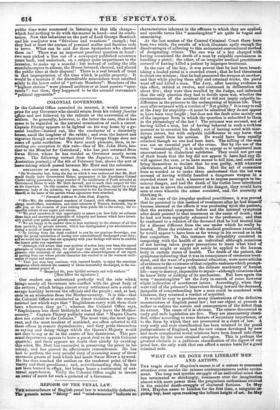REFORM OF THE PENAL LAW.
Tim nomenclature of English penal law is wretchedly defective. The generic terms "felony' and " misdemeanour " indicate no
characteristics inherent in the offences to which they are applied, and specific terms like " manslaughter " are quite as vague and unmeaning.
At the last session of the Central Criminal Court there have been two trials, the results of which illustrate aptly enough the disadvantages of adhering to this antiquated conventional method of designating crimes. The one was of a boy charged with having occasioned the death of a man by culpable carelessness in handling a pistol ; the other, of an irregular medical practitioner accused of having killed a patient by improper treatment.
In the case of the boy, it was proved that he had been brand- ishing a loaded pistol in a crowded street ; that he had threatened to shoot one witness ; that he had presented the weapon at another; and that while playing these silly and criminal tricks, the pistol went off and killed a man. The Jury, after hearing evidence to this effect, retired at twelve, and continued in deliberation till about, five ; they were then recalled by the Judge, and informed that the only question they had to decide upon was, whether the circumstances of the accident did or did not imply culpable in- difference in the prisoner to the endangering of human life. They soon after returned with a verdict of "Not guilty." It is easy to rail at the Jury for stupidity—it must be admitted they do not appear to have been very bright ; but does not the fault arise mainly out of the improper form in which the question is submitted to them in the phraseology of the law ? The prisoner was accused, not of having killed a man, but of having behaved in such a reckless manner as to occasion his death ; not of having acted with mur- derous intent, but with culpable indifference to any harm that might result from his actions. He would have been equally criminal though no one had been hurt_ The killing of the men was not an essential ,part of the crime. But by the use of the term "manslaughter," it is made to appear so to unlettered men unaccustomed to dialectical subtleties. They could not get out of their heads that the boy did not appear to have had any ill- will against the man, or to have meant to kill him, and could not bring themselves to declare that he was guilty, with whatever alleviations, of having killed him. Had the act of accusation been so worded as to make them understand that the lad was accused of having wilfully handled a dangerous weapon in a crowded street in such a manner _as to expose passengers to im- minent danger, -and had the death of his victim been introduced as an item to prove the existence of the danger, they would have seen at once wherein the crime consisted, and the necessity of checking it. In the case of the irregular medical practitioner, it was proved that he persisted in this method of treatment after he had himself become alarmed at the effects it was producing upon the patient; that the external symptoms before and the internal symptoms after .death pointed to that treatment as the cause of death ; that he had not been regularly educated to the profession; and that he confessed to a relation of the deceased that he had treated hint for a disease different from the one under which he really la-. boured. From the evidence of the medical gentlemen examined, he would appear to have been as far wrong in his second as in his first conjecture. In this instance the culpability consisted in tampering with the health of an individual although conscious of not having taken proper precautions to learn what kind of treatment might or might not safely be applied to the human body in certain states of health. The death of the patient, the symptoms indicating that it was in consequence of erroneous treat- ment, and the want of a professional education, were mere articles of evidence to the existence of that culpable rashness which prompt- ed the accused to tamper with the delicate machinery of human life—easy to destroy, impossible to repair—although conscious that he knew little or nothing of its mechanism. But here again the term "manslaughter" set the Jury in search of some however slight indication of murderous intent.. Accordingly, when they were told of the prisoner's benevolent feeling toward the deceased, incapable of comprehending how a man could be murdered with kindness they returned a verdict of acquittal. It would be easy to produce many illustrations of the defective nomenclature of English penal law ; but our object at present is rather to enforce the nature and consequences of the defect thug its extent. The cause of it is obvious. The crimes denounced in early and rude legislation are few. They are inaccurately classi- fied, either according to some feature of secondary importance, or to the form by which they are prosecuted in a court of law. A very early and rude classification has been retained in the penal jurisprudence of England, and the new crimes developed by new and more complicated social relations have been forced into these categories by the most strained analegies. This is perhaps the greatest obstacle to a judicious classification of the digest of our penal law, the only work that can afford a secure basis for a good criminal code.


























 Previous page
Previous page